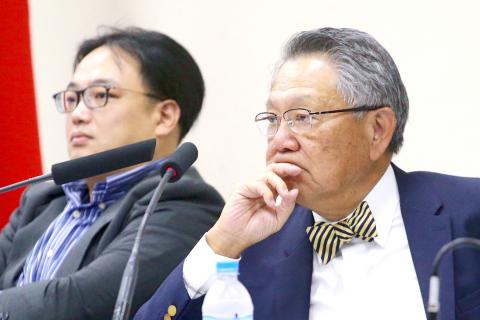Chinese Nationalist Party (KMT) Vice Chairman Steve Chan (詹啟賢) yesterday denied that “one China, with different interpretations [of what ‘China’ means]” has been scrapped in the party’s policy platform, contrary to what some KMT lawmakers have said.
Chan made the remarks in response to reporters’ questions about a dispute at Friday’s KMT caucus meeting, at which some KMT lawmakers voiced discontent over the party’s new policy platform, which was said to omit “one China, with different interpretations,” keeping only the so-called “1992 consensus.”
The “1992 consensus” — a term former Mainland Affairs Council chairman Su Chi (蘇起) admitted making up in 2000 — refers to a supposed understanding between the KMT and the Chinese government that both sides acknowledge there is “one China,” with each side having its own interpretation of what “China” means.

Photo: CNA
Chan said on the sidelines of a vote for the head of the party’s Youth League that the text “1992 consensus” and “one China, with different interpretations” are clearly stated in the preamble of the new policy platform put forward on Sept. 4, adding that it does not mean the latter part has been deleted just because it is not in the rest of the document.
When asked about strife within the party over the issue, Chan said: “What strife is there if the deletion in dispute is nonexistent?”
The “1992 consensus” and “one China, with different interpretations” referred to by Chan appear in a paragraph that delineates the party’s past endeavors to improve cross-strait ties, which “started in 2005 with former KMT chairman Lien Chan’s (連戰) trip of peace [to China] that broke the cross-strait standoff and former President Ma Ying-jeou (馬英九) maintaining the status quo according to the Republic of China [ROC] constitutional framework and reinstating cross-strait negotiations and exchanges with ‘1992 consensus’ and ‘one China, with different interpretations’ as the foundation,” according to the platform.
In the chapter titled “Policy platforms for different fields” in a section about promoting cross-strait exchanges, the platform says the “1992 consensus should be deepened on the basis of the ROC Constitution and the possibility of ending cross-strait hostility with a peace agreement should be proactively pursued.”
KMT Legislator Huang Chao-shun (黃昭順) on Friday expressed doubts about the party headquarters’ changes to the policy.
She said that the “1992 consensus” and “one China, different interpretations” are among the KMT’s “stronger arguments regarding [Beijing] in past years, so I insist that they must be there” in full.
“Sunny Snail,” the name of a group of KMT Chairwoman Hung Hsiu-chu’s (洪秀柱) young supporters, posted news reports and comments on Facebook later on Friday, accusing the KMT caucus of revealing discussions that should have been behind closed doors.
The group criticized remarks reportedly made by Huang saying the policy change would pave the way for others to “smear the party.”
Huang said if there is a problem, the group should contact her.
Additional Reporting by CNA

INVESTIGATION: The case is the latest instance of a DPP figure being implicated in an espionage network accused of allegedly leaking information to Chinese intelligence Democratic Progressive Party (DPP) member Ho Jen-chieh (何仁傑) was detained and held incommunicado yesterday on suspicion of spying for China during his tenure as assistant to then-minister of foreign affairs Joseph Wu (吳釗燮). The Taipei District Prosecutors’ Office said Ho was implicated during its investigation into alleged spying activities by former Presidential Office consultant Wu Shang-yu (吳尚雨). Prosecutors said there is reason to believe Ho breached the National Security Act (國家安全法) by leaking classified Ministry of Foreign Affairs information to Chinese intelligence. Following interrogation, prosecutors petitioned the Taipei District Court to detain Ho, citing concerns over potential collusion or tampering of evidence. The

‘FORM OF PROTEST’: The German Institute Taipei said it was ‘shocked’ to see Nazi symbolism used in connection with political aims as it condemned the incident Sung Chien-liang (宋建樑), who led efforts to recall Democratic Progressive Party (DPP) Legislator Lee Kun-cheng (李坤城), was released on bail of NT$80,000 yesterday amid an outcry over a Nazi armband he wore to questioning the night before. Sung arrived at the New Taipei City District Prosecutors’ Office for questioning in a recall petition forgery case on Tuesday night wearing a red armband bearing a swastika, carrying a copy of Adolf Hitler’s Mein Kampf and giving a Nazi salute. Sung left the building at 1:15am without the armband and apparently covering the book with a coat. This is a serious international scandal and Chinese

Seventy percent of middle and elementary schools now conduct English classes entirely in English, the Ministry of Education said, as it encourages schools nationwide to adopt this practice Minister of Education (MOE) Cheng Ying-yao (鄭英耀) is scheduled to present a report on the government’s bilingual education policy to the Legislative Yuan’s Education and Culture Committee today. The report would outline strategies aimed at expanding access to education, reducing regional disparities and improving talent cultivation. Implementation of bilingual education policies has varied across local governments, occasionally drawing public criticism. For example, some schools have required teachers of non-English subjects to pass English proficiency

TRADE: The premier pledged safeguards on ‘Made in Taiwan’ labeling, anti-dumping measures and stricter export controls to strengthen its position in trade talks Products labeled “made in Taiwan” must be genuinely made in Taiwan, Premier Cho Jung-tai (卓榮泰) said yesterday, vowing to enforce strict safeguards against “origin laundering” and initiate anti-dumping investigations to prevent China dumping its products in Taiwan. Cho made the remarks in a discussion session with representatives from industries in Kaohsiung. In response to the US government’s recent announcement of “reciprocal” tariffs on its trading partners, President William Lai (賴清德) and Cho last week began a series of consultations with industry leaders nationwide to gather feedback and address concerns. Taiwanese and US officials held a videoconference on Friday evening to discuss the